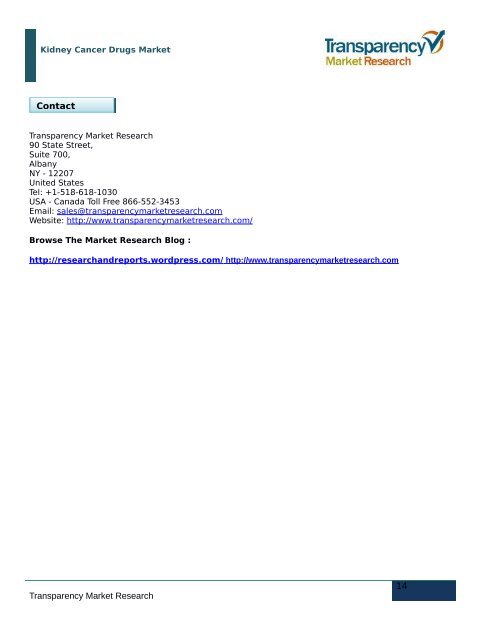Kidney Cancer Drugs Market - Global Industry Analysis, Pipeline Analysis, Size, Share, Growth, Trends and Forecast 2014 – 2020
Kidneys are among the most crucial organs of the human body. Their role in regulating blood pressure and serving homeostatic functions is critical in maintaining the balance of nutrients and toxins in the body. Kidneys serve as natural blood filters, removing the water-soluble wastes and reabsorbing the essential elements from the blood. Since they play such a crucial role, kidneys require constant regeneration of dead nephrons and proper blood circulation to maintain healthy cell growth, due to which, they are susceptible to metastasis and cancerous tumors. Renal cell carcinoma, the most common type of kidney cancer, is among the toughest cancers to treat, especially in the advanced stages. Until 1980’s, the treatment of kidney cancer included surgical removal of the kidneys. The treatment later progressed to laparoscopic removal of the tumor-affected part of the kidneys, significantly increasing the survival rate and patient comfort. Drugs are usually given to stage four advanced renal cell carcinoma patients with disease progression. Various forms of cancer treatment mechanism have been implemented among the presently approved drugs for kidney cancer; these include, VEGF (Vascular Endothelial Growth Factor) inhibitor, angiogenesis inhibitor, cytokine therapy, and immune modulation therapy to name a few.
Kidneys are among the most crucial organs of the human body. Their role in regulating blood pressure and serving homeostatic functions is critical in maintaining the balance of nutrients and toxins in the body. Kidneys serve as natural blood filters, removing the water-soluble wastes and reabsorbing the essential elements from the blood. Since they play such a crucial role, kidneys require constant regeneration of dead nephrons and proper blood circulation to maintain healthy cell growth, due to which, they are susceptible to metastasis and cancerous tumors. Renal cell carcinoma, the most common type of kidney cancer, is among the toughest cancers to treat, especially in the advanced stages. Until 1980’s, the treatment of kidney cancer included surgical removal of the kidneys. The treatment later progressed to laparoscopic removal of the tumor-affected part of the kidneys, significantly increasing the survival rate and patient comfort. Drugs are usually given to stage four advanced renal cell carcinoma patients with disease progression. Various forms of cancer treatment mechanism have been implemented among the presently approved drugs for kidney cancer; these include, VEGF (Vascular Endothelial Growth Factor) inhibitor, angiogenesis inhibitor, cytokine therapy, and immune modulation therapy to name a few.
Create successful ePaper yourself
Turn your PDF publications into a flip-book with our unique Google optimized e-Paper software.
<strong>Kidney</strong> <strong>Cancer</strong> <strong>Drugs</strong> <strong>Market</strong><br />
Contact<br />
Transparency <strong>Market</strong> Research<br />
90 State Street,<br />
Suite 700,<br />
Albany<br />
NY - 12207<br />
United States<br />
Tel: +1-518-618-1030<br />
USA - Canada Toll Free 866-552-3453<br />
Email: sales@transparencymarketresearch.com<br />
Website: http://www.transparencymarketresearch.com/<br />
Browse The <strong>Market</strong> Research Blog :<br />
http://research<strong>and</strong>reports.wordpress.com/ http://www.transparencymarketresearch.com<br />
Transparency <strong>Market</strong> Research<br />
14

















